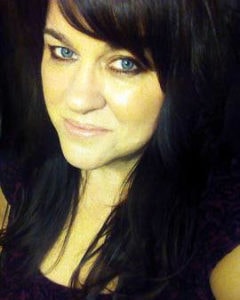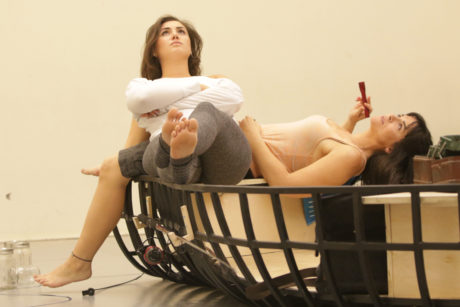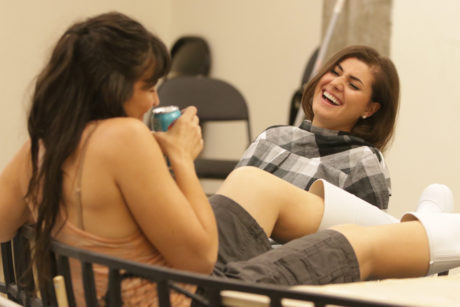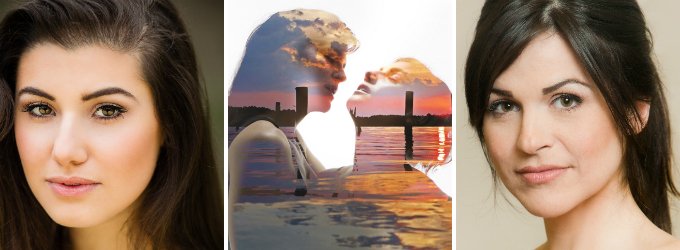John: I first discovered your writing when I saw Maytag Virgin during the Women’s Voices Theater Festival, and as I said when I interviewed you back then, “it was one of those experiences of an artist’s work that make me want to see everything they do.” So when I learned that that Signature Theatre would be producing a new play of yours, The Gulf, I could barely contain my excitement. Thank you so much for agreeing to talk with me about it. (The play, I mean. But we could probably talk about my excitement too!)

Audrey: It’s always a pleasure talking with you John. I love your warm and generous spirit. You are a beautiful human.
I was fortunate to have a chance to read the script of The Gulf to prepare for this conversation, and I don’t want to give too much of it away, but I was laughing out loud at the humor in it and absolutely blown away by the honesty and insight of it. You have an awesome gift for writing characters whose hearts are revealed in beautiful, bold, and breathtaking ways. I just love what you do.
That’s really kind of you, John. It’s bizarre. Sometimes I’m sitting there in rehearsal and an actor will say a line, and I don’t even remember writing it. I think I must go away to some other place when I’m writing. That’s the only explanation.
In The Gulf there are two characters, two women, Betty (played by Maria Rizzo) and Kendra (Rachel Zampelli). They have been lovers for about six years, and now they’re afloat out in a boat in shallow waters of the Alabama delta because Kendra likes to fish and Betty, who doesn’t, wants to be with her. Over the course of the play the tensions in their relationship are exposed and…. Well now I suddenly feel ridiculous explaining the setup of play to the person who wrote it. Maybe I’d do better to ask: How would you have said what I just tried to say about the characters’ situation when the play begins?
Stasis. Because the use of that word implies that there must have been a time of strife or unrest. Betty is musing about cats and reading a book. Kendra is fishing. All seems fine, but it’s surface-level stuff. To me it reminds me of those movies where someone has pulled the pin on a grenade and the inevitable is coming, you just don’t know how bad it’s going to be. One sudden move, one sneeze, one consonant out of place, and the whole thing blows up. But at that moment, the world seems idyllic, and deceptively calm.
I’m curious to know what people get from it on a second reading or second viewing. Like the second time I watched The Sixth Sense. I felt like all the things I took for granted during my first viewing, things I read as neutral or as exposition, were now making a show of themselves, prescient and cocky, even…like, hey, I told you so the first go-round, you just weren’t paying attention I had the same reaction a few days ago when I watched the banjo scene from Deliverance. It’s a gorgeous moment. And maybe on my first viewing, it read like joy. But knowing now how the movie unfolds and then watching the scene again, I was struck by the tension, how the harmless volley between the city boys and the country boys (echoed so perfectly, of course, in the now famous “dueling banjos”) felt poised to crack at any moment. Right before the song starts, Ned Beatty says, “Talk about genetic deficiencies, isn’t that pitiful.” And then a dude walks up to him and Burt Reynolds and asks, “Who’s picking a banjo here?” Brilliant.
The Gulf takes place entirely in a flat-bottomed boat. There’s no shore, everything happens on water. It’s as if Betty and Kendra’s relationship is figuratively and maybe literally adrift without an anchor. No solid ground to stand on. What gave you the idea to locate this play that way? And did you know when you began what curiously destabilizing psychological resonance it would have for the characters and their story (and, I imagine, for the audience)?
I knew two things. I knew I wanted to write a play called The Gulf. I wanted to explore all its meanings. The water. The void. The abyss. The disparate ideas the two characters have on just about everything. I knew there was a boat. I knew there were women in it and I knew they were fighting and I wanted to figure out why. I also knew that the violence would be disturbing at times, and not just the physical violence but the verbal assault, which is probably way more damaging than the physical stuff. I just don’t often see that kind of dynamic between women on the stage or screen, and I wanted to take it as far as I could.
I haven’t a clue how all that water will exist onstage in the ARK Theatre, and I look forward to being surprised. I figure it won’t be like one of those big tanks used to shoot movies! I do guess that there’ll be a boat, since I’ve seen a photo of the two actors rehearsing in a boat frame. When you were writing the play and specifying this exceptionally aqueous setting, what were you thinking? (I’m asking what I imagine might have been the set designer’s first reaction.)
I think I figured that if it were to work it would be spectacular and I was willing to take that risk. I also knew the story was strong enough that even if we never saw actual water, even if the whole thing was played on stage cubes, it would still be pretty spectacular. But how often do you get to see a boat on stage? It’s an exciting idea. Two women. Fishing in the Alabama delta. At night. On a boat. Fighting for their lives. I think (I hope) I’ve created a visual never before seen on the American stage. And in this rendering, you will not believe what [Director] Joe Calarco and [Scenic Designer] Paige Hathaway have done to create that world. It is nothing short of a miracle. No “tanks,” John, sorry. :) But there will be water!

Again, I don’t want to give too much about the play away, but I was really struck by how the tensions and conflicts in Betty and Kendra’s relationship were totally believable as specific to them, yet at the same time they seemed recognizable emotional themes that many couples might find themselves identifying with. I know I did, just from reading. I thought that dynamic was somewhat going on between your two characters in Maytag Virgin, but in The Gulf it seems to me to go even deeper, kind of with more universality. Would you agree? And was that on your mind as you were writing—the fact that Betty and Kendra’s particular relationship issues might echo in others’ lives as well?
Well, that’s kind of what I’m getting at. I focus on two-handers, character-driven narratives. They are all love stories. All of them. I construct them and distill them in such a way that the audience can let go and focus on the sounds and the vibrations. It’s heavy on tension, low on sentiment. Those are the kinds of plays that pull me in, so those are the ones I like to write. We see ourselves in the characters, not because we recognize them, but because we recognize the ache. And the levity is critical. It’s a primer. With Maytag Virgin, we witness the newness of love, and with The Gulf, we watch it imploding. Perhaps The Gulf seems more familiar because it is the everyday work of love. There reaches a point in most relationships where the shine is off and you look over at that person and think, you’re not the person I married. And they’re looking back at you and thinking the same damn thing.
I’m sure you’re familiar with the Bechdel test. The only slightly tongue-in-cheek criterion—conceived by the lesbian cartoonist Alison Bechdel (whose growing-up story is told in the musical Fun Home—asks whether a work of dramatic fiction has at least two women who talk to each other about something other than a man. In a very powerful and eloquent way, The Gulf would probably qualify for the Bechdel test Top Ten (if there is such a thing). All of which is throat-clearing so I can ask you my last big open-ended question:
Would you share your thoughts about the role of women playwrights in theater today? How as a woman playwright do you see your responsibility for writing women characters? And if you could tell other playwrights anything—anything at all—about writing parts for women, what would it be?
Admittedly, roles for women are not as plentiful as they should be. However, writing roles for women is really no different than writing roles for men. What separates forgettable roles from those we cherish is not a trade secret. It’s really simple, you get out what you put in. People don’t fall in love with plot, they fall in love with people. So, I don’t think in terms of how the plot will unfold, I think about how badly I can break a heart today. And then I do it. And then I describe that pain. And then I add light and levity, so it’s easier to breathe in a room with no air.
A lot of it is in the distillation process, reducing the noise. Probably the biggest lesson I’ve learned in studying playwriting is the value of silence. Of negative space. It is in these moments when you really see what your character is made of. The way she looks at him. The way he speaks without speaking. The way she watches him when his back is turned. The way neither one of them can find the words. Much of this is not written in the stage directions, but a good director will find it if the silence is intentional and if you strip the dialogue to the bone. Remove every single syllable that does not belong. Give your actors something to do. Be ruthless, the fewer words the better.

I want for women playwrights the same thing I want for all playwrights. I want them to get what they came for. Theaters are looking for exciting work and they want to do work by women, they just need the right pieces. I’ve learned to keep my plays lean and economical so that they fit into any budget anywhere. I don’t want to give any theater an excuse not to do my plays. I want them to think, well, this is just good business…oh and look, it’s written by a woman…even better.
Thank you, Audrey. I cannot wait to see The Gulf.
Always a pleasure John. Thanks for doing what you do.
The Gulf plays September 13 through November 6, 2016 in the ARK Theatre at Signature Theatre – 4200 Campbell Avenue, in Arlington, VA. For tickets, call the box office at (703) 820-9771, or purchase them online.





